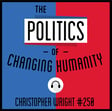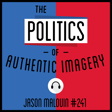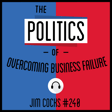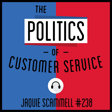
233: The Politics of Reframing Adversity - Martin Bean
Bad things can and do happen to all kinds of people. It can be hard to see the good or the why in such times and adversity is not something we can always easily “get over”. Yet maybe we can. Positive thinking and reframing go hand in hand – we can for example choose to focus on the positive aspects of a situation, rather than the negative. Reframing reduces negative emotions, increases feelings of optimism and hope, and improves overall mood and outlook on life. How do we do that better?
Today’s guest Professor Martin Bean CBE is a visionary leader shaping the future of education and work. As CEO of The Bean Centre, he drives partnerships with pioneering experts, cutting-edge technology companies, and forward-thinking executive leaders to create a future that works. He is also Co-author of the book "Toolkit for Turbulence," Martin equips leaders with tools and strategies to navigate change, seize opportunities, and foster resilient teams.
Currently a Professor at the University of New South Wales, Martin's expertise lies in exploring the evolving landscape of work and lifelong learning. He shares his knowledge as a mentor at Mentor List, connecting Australia's brightest minds. Previously, Martin served as Vice-Chancellor and President of RMIT University, an institution with over 80,000 students in Melbourne, Australia. He also held the position of Vice-Chancellor at The Open University, the United Kingdom's largest academic institution, and served as General Manager of Microsoft's global Education Products Group in Seattle, Washington.
In 2012, Martin launched FutureLearn, the UK's first provider of Massive Open Online Courses (MOOCs), earning him the distinction of being named one of the UK Prime Minister's Business Ambassadors in 2014. Martin represented the Australian Government on the Commonwealth of Learning and was appointed one of three Business Champions to support the Australia-Vietnam Strategic Partnership in 2021. Acknowledged for his contributions to education, Martin has received prestigious awards, including an Honorary Doctor of Laws from the University of London and appointment as a Commander of the Order of the British Empire (CBE) for his services to higher education.
Tune in to hear Martin discuss:
1. Explain what reframing adversity is about and why it is a helpful tool to use.
2. Are there times beyond work when adversity is not something to be “reframed” or seen differently like losing your partner, a serious illness diagnosis, or a serious accident?
3. How can we best teach leaders and our teams to face adversity better and win?
4. How can we become more accepting of change?
5. Takeaway: What is your final message on The Politics of Reframing Adversity?
Connect further:
https://toolkitforturbulence.com
http://linkedin.com/in/professor-martin-bean-cbe-84655b1a2
POE listener offer:
Zencastr is my podcast platform of choice. Use my special link (zen.ai/thepoliticsofeverything30 [http://zen.ai/thepoliticsofeverything30]) and use code "THEPOLITICSOFEVERYTHING" to save 30% off your first three months of Zencastr professional. #madeonzencastr



















